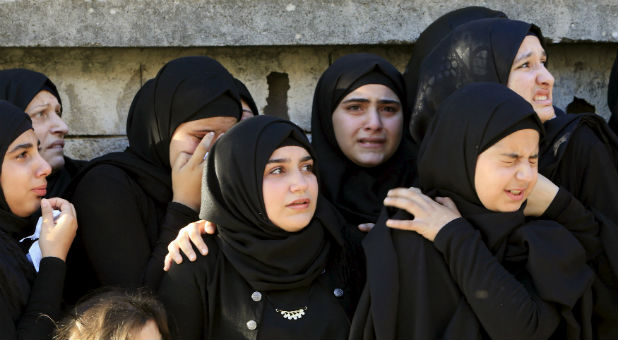When a Muslim Shot His Daughter, This Man Could Have Responded in Hate
Ray was taking his 10-year-old daughter, Hannah, to the beach in a West African country.
It was about a month after Sept. 11, 2001, and Ray said the travel restrictions for Americans had been lifted in the country where he was serving as a humanitarian worker for a worldwide nonprofit.
Ray was driving; Hannah was in her new swimsuit. A Muslim man approached the car from the sand dunes and greeted Ray with a formality.
Then—the unthinkable.
The man held the gun to Ray’s temple and fired multiple blanks. When the bullet finally left the barrel, it went through Ray’s arm into Hannah’s chest.
Fourteen years have now passed, and Ray and Hannah are both amiable to talking about the ordeal, with one caveat for the Muslim people they worked with: “Please don’t associate (them) with the radical fringe.”
In light of the Paris terrorist attacks and the rise of the Islamic State, it’s a message the father and daughter are desperate to get to the church—that the everyday Muslims are not our enemies.
For Hannah, the bullet that could have killed her never reflected a religion: “When I was curled up in fetal position bleeding, I asked my dad if that’s a terrorist, and he said yes, so I thought, ‘OK, he’s a terrorist.’
“In terms of today, if it affects my view of Muslims, no, because after the shooting, once we eventually returned, fellow Muslims were my friends in school and outside school. They were so loving, and thanked me for coming back to give the country a second chance. It was a key part of restoration and healing.”
For Ray, the incident that could have scarred his family was motivation to continue outreach to a hurting, marginalized group.
“Muslims more than ever before are suffering,” Ray says. “More than ever before in their history, they’re vulnerable. Muslim people live in the poorest parts in the world today where there’s a lot of injustice. Injustice and nonstop hopelessness can breed radical acts.”
To fight the growth of ISIS and assist the American church in reaching out to Muslims, Ray offers three specific points, especially as many in the church are worried terrorists could be infiltrating the U.S. by way of refugee status.
First, the American church needs to learn about Muslims, which are one of the most unreached people groups on the planet. If we want to share Jesus with them, we must understand their stories.
Second, the church needs to look at the Muslim world with the compassion and love of Jesus rather than the disdain many seem to promote after radical Islamic attacks.
Third, do not allow the media to redefine Christian tenets such as faith with fear.
Ray says he believes that if Jesus were walking the earth today, the parable of the Good Samaritan would be retitled “The Good Muslim,” and the Samaritan woman at the well would be a Muslim.
“In our view of the world, we cannot let radical acts allow us to be motivated by fear of the unknown or cause us to redefine our position,” Ray says. “We have to remember Jesus equipped us with love.”
For Hannah, who is now in her mid-20s, this radical love allowed her to face her shooter in prison and offer forgiveness.
In fact, it was this act of violence that has reinforced her faith for the last few decades. Admittedly, the reality of the shooting didn’t impact her until she was an adult, but now, it’s a driving force for how she lives her life.
“There is no way to deny the amazing truth of my story,” Hannah says. “It’s kept my faith very strong and has been the foundation if my faith growing up.”
The young woman begs the American church to go outside of themselves to reach out to hurting people, especially in light of the recent violence. But to do that, first, we must understand the radical love Christ first gave us.
“Allow yourself to be loved, so He can help you love other people,” she says.
And for Ray, it’s the modern-day civil rights battle, giving the church a chance to bring revival to those who are suffering.
“I think we have opportunities more than ever before in history to deeply touch Muslims with compassionate love,” Ray says. “If anything, the church should be leading the march against injustices, against suffering. … Is the church going to miss out on another opportunity to take the lead with compassionate love, to reach out to people who are really suffering, really need our care? I carry a heartache for the church, for us to engage the world holistically as very clearly Jesus lived out and commanded us to do.”














































